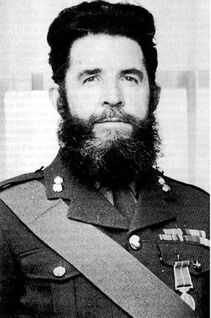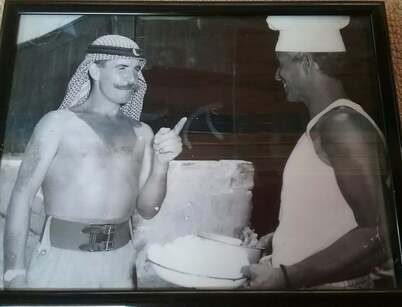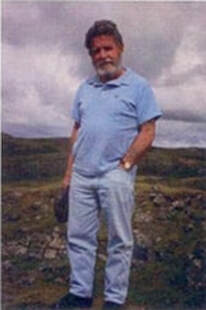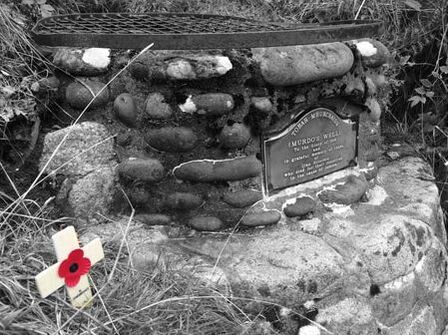|
The late Murdo Nicolson was a dedicated member of Clan MacNeacail Skye committee, he almost single-handedly built the cairn on Beinn Chracaig and performed the role of “caretaker” around the Trust’s land for many years. Murdo had a distinguished service career which culminated in him receiving the British Empire Medal.
I was born in what is now called Bayfield, the old people called it Cockle Street, the old road being formed of sand and shells from the shore - I suppose that is why it was called Cockle Street. My father was Sandy Nicolson. He was one of three brothers and five sisters. His youngest brother, the one I’m named after, was killed in Flanders during the First World War. My father was also wounded in this war. I believe he was only 17 years old. At least four young men from Bayfield paid the supreme sacrifice in World War One. My family have a long association with the Army. My youngest brother Roddie was a regular solder for 22 years in the Army and another brother, Angus, served with the Seaforth Highlanders in World War Two.
|
My uncle Domhnullan was well known in Portree, he worked in the Portree Hotel for years and latterly drove the bank van. It was the National Bank then, it is now the Royal Bank.
In my young days Portree was a very small village, nothing to what it is like today. It was a good place to be brought up - everybody knew everybody else. I remember Portree when perhaps only one car in a whole day would pass by!
I went to Portree High School, but I really had no interest in school. I loved boats and being out of doors. In fact, I couldn’t get out of the school quick enough! My father had a boat, in fact, he looked after a boat for Lord Airedale. It was called the “Fionnaghalla” and that boat was used by the local doctor, Doctor Scott, and it was in that boat I first visited Raasay. In emergencies the “Fionnaghalla”, the doctor and my father would go across to Raasay, and many a bad, dirty day they went over there. When Lord Airedale became too old to come to Skye on holiday, he gave the boat to my father. It was originally one of the “Fifties”, I believe, done up as a yacht.
One of the highlights of my young days was before the war watching the Lovat Scouts returning from their annual camp. They had come off the steamer and formed up - 30, perhaps 40 horses - and they charged up the Quay Brae, right along Wentworth Street and along to the Drill Hall. What a magnificent sight it was! Then war broke out, I would be 17 or thereabouts, and I remember when the local Cameron Highlander Territorials were called away. What a sad day that was - I remember watching two or three veterans of the First World War and one of them who I used to think was a hard, hard man was crying on the pier as he waved his fellows off. He knew what was ahead of those boys, they didn’t, and it was just as well they didn’t!
I don’t know why, but all the young fellows wanted to go away to the war and I couldn’t get away quick enough. As soon as I was of age I volunteered for the Royal Marines. And I had a bit of a job getting in because I wasn’t very tall then - just 5’5”. I had to go to Inverness for my medical and the doctor said: “I’m sorry, but you’re too short for the Marines.” But I replied: “But I’m only a young fellow yet, surely I’ll grow before I get called away.” He sympathised with me and put me down as being 5’7”. . . . but I never grew a bit, not an inch, and so I was in the Royal Marines as a small man among very big men. But that didn’t make too much difference to me as I was very fit at the time.
After my basic training I volunteered for the Marine Commandos and did my 12 weeks basic training in North Wales where they weeded out those who would not make the grade. If you passed through there you went to Achnacarry, outside Fort William, to do a further 16 weeks’ training. That was really tough going - I think they tried to break us with harsh conditions, speed marches and the like.
In my young days Portree was a very small village, nothing to what it is like today. It was a good place to be brought up - everybody knew everybody else. I remember Portree when perhaps only one car in a whole day would pass by!
I went to Portree High School, but I really had no interest in school. I loved boats and being out of doors. In fact, I couldn’t get out of the school quick enough! My father had a boat, in fact, he looked after a boat for Lord Airedale. It was called the “Fionnaghalla” and that boat was used by the local doctor, Doctor Scott, and it was in that boat I first visited Raasay. In emergencies the “Fionnaghalla”, the doctor and my father would go across to Raasay, and many a bad, dirty day they went over there. When Lord Airedale became too old to come to Skye on holiday, he gave the boat to my father. It was originally one of the “Fifties”, I believe, done up as a yacht.
One of the highlights of my young days was before the war watching the Lovat Scouts returning from their annual camp. They had come off the steamer and formed up - 30, perhaps 40 horses - and they charged up the Quay Brae, right along Wentworth Street and along to the Drill Hall. What a magnificent sight it was! Then war broke out, I would be 17 or thereabouts, and I remember when the local Cameron Highlander Territorials were called away. What a sad day that was - I remember watching two or three veterans of the First World War and one of them who I used to think was a hard, hard man was crying on the pier as he waved his fellows off. He knew what was ahead of those boys, they didn’t, and it was just as well they didn’t!
I don’t know why, but all the young fellows wanted to go away to the war and I couldn’t get away quick enough. As soon as I was of age I volunteered for the Royal Marines. And I had a bit of a job getting in because I wasn’t very tall then - just 5’5”. I had to go to Inverness for my medical and the doctor said: “I’m sorry, but you’re too short for the Marines.” But I replied: “But I’m only a young fellow yet, surely I’ll grow before I get called away.” He sympathised with me and put me down as being 5’7”. . . . but I never grew a bit, not an inch, and so I was in the Royal Marines as a small man among very big men. But that didn’t make too much difference to me as I was very fit at the time.
After my basic training I volunteered for the Marine Commandos and did my 12 weeks basic training in North Wales where they weeded out those who would not make the grade. If you passed through there you went to Achnacarry, outside Fort William, to do a further 16 weeks’ training. That was really tough going - I think they tried to break us with harsh conditions, speed marches and the like.

At the entrance to the house at Achnacarry there was reminder to us not to let our concentration lapse. It was a cemetery and on each cross the reason why the person had died was given. For example, one said: “This man died because he forgot to check his climbing rope.” Another said: “This man died because he forgot to check the pins in his grenades” and so on. The casualty rate was high - I remember one night, during a live assault landing on Loch Arkaig, there were seven young officers killed because their assault craft had wandered off the line of attack into fixed machine-gun fire
The training is something I will never forget. We had no mattresses on the beds, all we got was four blankets. The doors and the windows were removed from the Nissan Huts, our sleeping quarters - and we went there in January and were there until March. Very often when we went out for dinner there were bits of raw meat and vegetables lying on the table and we knew then that we had to go outside, build a fire and cook our own dinner! I had volunteered for all this - I was young, naïve and innocent, but I passed, and it was a great day for me the day they presented me with my green beret.
At the end of the course we had to go to Wrexham in North Wales to get our leave passes and our rail warrants. I went to the Troop Commander and said that I was from the Isle of Skye and asked if I could not get my leave from Achnacarry. But no, he said I had to go to Wrexham which was unbelievable, and I remember telling the Station Master in Spean Bridge: “I’ll see you in a couple of days, I have to go to North Wales to get a leave pass and a railway warrant to get back home to Skye!” I often wonder how we won the war.
At the end of the course we had to go to Wrexham in North Wales to get our leave passes and our rail warrants. I went to the Troop Commander and said that I was from the Isle of Skye and asked if I could not get my leave from Achnacarry. But no, he said I had to go to Wrexham which was unbelievable, and I remember telling the Station Master in Spean Bridge: “I’ll see you in a couple of days, I have to go to North Wales to get a leave pass and a railway warrant to get back home to Skye!” I often wonder how we won the war.
The training is something I will never forget. We had no mattresses on the beds, all we got was four blankets. The doors and the windows were removed from the Nissan Huts, our sleeping quarters - and we went there in January and were there until March. Very often when we went out for dinner there were bits of raw meat and vegetables lying on the table and we knew then that we had to go outside, build a fire and cook our own dinner! I had volunteered for all this - I was young, naïve and innocent, but I passed, and it was a great day for me the day they presented me with my green beret.
At the end of the course we had to go to Wrexham in North Wales to get our leave passes and our rail warrants. I went to the Troop Commander and said that I was from the Isle of Skye and asked if I could not get my leave from Achnacarry. But no, he said I had to go to Wrexham which was unbelievable, and I remember telling the Station Master in Spean Bridge: “I’ll see you in a couple of days, I have to go to North Wales to get a leave pass and a railway warrant to get back home to Skye!” I often wonder how we won the war.
At the end of the course we had to go to Wrexham in North Wales to get our leave passes and our rail warrants. I went to the Troop Commander and said that I was from the Isle of Skye and asked if I could not get my leave from Achnacarry. But no, he said I had to go to Wrexham which was unbelievable, and I remember telling the Station Master in Spean Bridge: “I’ll see you in a couple of days, I have to go to North Wales to get a leave pass and a railway warrant to get back home to Skye!” I often wonder how we won the war.
|
After passing out as a Commando I went to the Middle East and Sicily and saw active service there. I remember on our way to the invasion of Sicily I was up on deck one day and this big seaman came up to me and asked: “Where do you come from, boy?” I told him: “I come from the Isle of Skye” and he said “Away down to the focsle there, its rotten with Skyemen!” So, I went down there one evening, and there were four Skyemen there, five Lewismen, and one Barra man, and they all greeted me in Gaelic: “Oh Sgiathanach, bith Gaidhlig gu leor agad?” But at that time my Gaelic was very limited and I remember feeling terrible that I could not converse in my own language with fellow islanders.
|
And I tried to do something about it, and it did improve over the years - but it wasn’t easy for me because I was away from Skye so much. Those Skyemen looked after me well. I got a bunk in one of their cabins and a mug of tea was brought to me in the mornings. I was living like a lord! But the troop-decks were pretty horrendous places because you were packed like sardines in hammocks, nose to tail, and the food was pretty poor as well. But I was in comparative luxury!
I went to India after the European War was finished. The war in the Far East was still going and we trained very hard in India for the invasion of Malaya and our target was the island of Penang. We were already at sea, on our assault troop carrier, when we were mustered and told that the atomic bombs had been dropped and the war in the Far East was finished. We didn’t know whether to be happy or sad at missing out on something we had trained very hard for, but when you are young you have these daft ideas . . . we were then diverted to Hong Kong and we took over Kowloon from the Japanese. That was a very interesting experience - I remember the Japanese officers had to hand over their swords. These were often very treasured family heirlooms and I was selected to go round with the British officer who was accepting these swords and I often wonder whether it was because I was roughly the same height as the Japanese that I was chosen. All the other men were at least 5’7”. After that we became almost “security troops” - we did anti-piracy patrols, ensuring that junks and so on were not carrying contraband.
I went to India after the European War was finished. The war in the Far East was still going and we trained very hard in India for the invasion of Malaya and our target was the island of Penang. We were already at sea, on our assault troop carrier, when we were mustered and told that the atomic bombs had been dropped and the war in the Far East was finished. We didn’t know whether to be happy or sad at missing out on something we had trained very hard for, but when you are young you have these daft ideas . . . we were then diverted to Hong Kong and we took over Kowloon from the Japanese. That was a very interesting experience - I remember the Japanese officers had to hand over their swords. These were often very treasured family heirlooms and I was selected to go round with the British officer who was accepting these swords and I often wonder whether it was because I was roughly the same height as the Japanese that I was chosen. All the other men were at least 5’7”. After that we became almost “security troops” - we did anti-piracy patrols, ensuring that junks and so on were not carrying contraband.
There was a young fellow in the Hong Kong police who had been a prisoner of the Japanese and he decided to stay on in Hong Kong. He was looking for volunteers to join the Hong Kong police and I fancied the job because I loved the place. But I told him: “I wouldn’t get into your police because I’m too short.” But he said: “You would certainly get in.”
I didn’t join the police however. I had been abroad for quite a while and I thought I would go home first and then go out to Hong Kong again, but it didn’t work out that way.
I had had enough of the Army for the time being and decided not to continue in the service, so I went to sea for a while, but the pull of the Army was there and I re-enlisted. I went into the Highland Light Infantry and made it a career. I did a total of 25 years altogether.
And the B.E.M. ?
Well, I didn’t get it for standing in a NAAFI queue - I was recommended for it for “meritorious service” - or so it says on the medal. I got a very nice letter from Her Majesty regretting she was unable to present me with the medal, instead it was presented to me at Edinburgh Castle by the G.O.C. Scottish Command - General Derek Land. It was quite an honour for a wee boy from Skye to get.
I didn’t join the police however. I had been abroad for quite a while and I thought I would go home first and then go out to Hong Kong again, but it didn’t work out that way.
I had had enough of the Army for the time being and decided not to continue in the service, so I went to sea for a while, but the pull of the Army was there and I re-enlisted. I went into the Highland Light Infantry and made it a career. I did a total of 25 years altogether.
And the B.E.M. ?
Well, I didn’t get it for standing in a NAAFI queue - I was recommended for it for “meritorious service” - or so it says on the medal. I got a very nice letter from Her Majesty regretting she was unable to present me with the medal, instead it was presented to me at Edinburgh Castle by the G.O.C. Scottish Command - General Derek Land. It was quite an honour for a wee boy from Skye to get.
Proudly powered by Weebly



